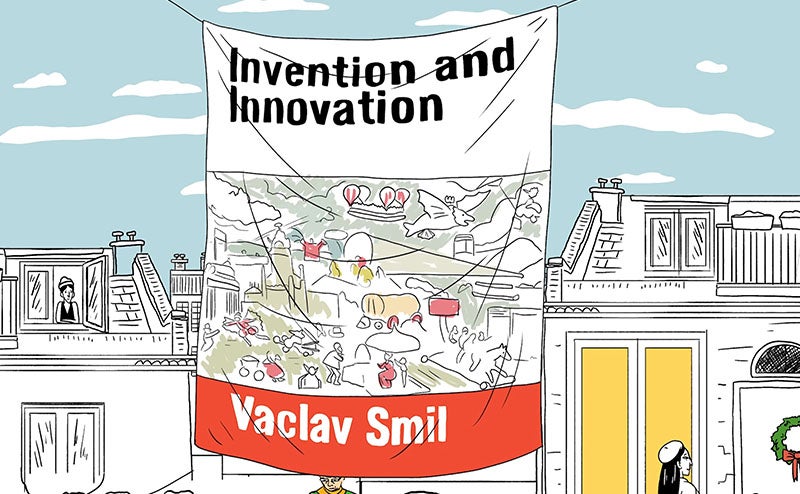More than three-quarters of the world’s poor rely on agriculture to earn a living.
Erik Larson’s The Splendid and the Vile has nothing to do with viruses or pandemics. But it is surprisingly relevant for these times.
The Splendid and the Vile is a brilliant account of another era of widespread anxiety: the years 1940 and 1941, when English citizens spent almost every night in makeshift shelters as massive bombs rained down on them. This German Blitzkrieg killed 44,652 Brits—almost 6,000 of them children—and seriously injured another 28,556.
But numbers don’t tell the story, and that’s why Larson works with small, intimate details. “I set out to hunt for the stories that often get left out of the massive biographies of Churchill, either because there’s no time to tell them or because they seem too frivolous,” Larson explains in the acknowledgments. The result is the kind of page-turner you always want in a history book but rarely get. I haven’t read any of Larson’s seven other books, but now I’m curious to read more of his work.
The most fascinating of Larson’s details come from contemporaneous accounts in private journals, including those of regular citizens as well as people close to Winston Churchill and Adolf Hitler. By weaving these details into one fast-paced narrative, Larson helps the reader feel what it’s like to live under aerial attack, which was very different from what I had imagined.
As the book’s title suggests, that time in British history was one of stark contrasts. At night, air-raid sirens would go off and the bombs would begin to fall with “an appalling shriek like a train whistle growing nearer and nearer, and then a sickening crash reverberating through the earth,” according to the journal of a London teacher. No one was safe from these nightly raids. In addition to trying to create as much panic as possible, Hitler and his bomber pilots targeted the king, queen, prime minister, and their families—and just barely missed them on several occasions.
And yet life would go back to something approaching normal the next morning. People literally and figuratively dusted themselves off and shuffled off to work, shopping, and play. “The shops of Piccadilly and Oxford Street still teemed with customers, and Hyde Park still filled with sunbathers, more or less confident that German bombers would not pass overhead until after dusk,” Larson writes.
Larson argues that Churchill’s leadership was probably the number-one reason the British people persevered. Before he became prime minister, the eccentric and crass Churchill had many powerful detractors, including the king who appointed him (George VI) and U.S. Ambassador to the United Kingdom Joseph Kennedy. But it soon became clear to nearly everyone that Churchill was ready to rally a weakened country that was at risk of getting slaughtered by Hitler’s forces.
One of Churchill’s gifts was his ability to move people through words. He gave his fellow Brits a mix of brutal honesty and credible hope. Speeches likes his famous “blood, toil, tears, and sweat” speech helped the British people see themselves as “protagonists on a vaster scene and as champions of a high and invincible cause, for which the stars in their courses were fighting,” in the words of one of Churchill’s private secretaries.
Another of Churchill’s gifts was his bandwidth. He worked around the clock, overseeing almost all the details of the war effort—including hiring a talented team that could cut through bureaucracy, developing new technologies for neutralizing Nazi advantages, and persuading America to join the war. Larson gives the reader a “you are there” sense of the intensity of Churchill’s work with his team on life-and-death challenges—and solving them at a pace I found to be mind-blowing.
Another leadership quality was his fearlessness. In fact, he drove his security officer crazy by constantly putting himself in harm’s way. “Fires still burned and crews were still digging bodies from wrecked buildings when Churchill arrived in the East End,” Larson writes. Churchill spent hours with the East Enders, listening to their stories and offering reassurance that the Royal Air Force was going to take the fight to Berlin.
“Churchill is the main protagonist, but Larson does a great job bringing other fascinating characters to life.”
For all these reasons, Churchill is the main protagonist of The Splendid and the Vile, but Larson does a great job bringing other fascinating characters to life. He picked a limited number of these supporting characters, so you never get lost or frustrated trying to follow lots of obscure names.
One of my favorites was Max Aitken, better known as Lord Beaverbrook. Churchill put Beaverbrook, whose main claim to fame was owning the largest circulation newspaper in the world, in charge of accelerating the production of fighters and bombers. Beaverbrook was reluctant to take the role, tried to quit numerous times, and earned the disdain of just about every military leader. And yet he had absolutely the right skillset and personal connection to Churchill for getting around the military bureaucracy and scaling up production to levels no one thought possible.
Another flawed but brilliant character was Frederick Lindemann, known to most as “The Prof” because of his affiliation with Oxford University. Even though The Prof was of German birth and irritated almost everyone around him with his arrogance, Churchill adored him and brought him into his inner circle as chief scientific advisor. The Prof made many mistakes—including persuading Churchill to bomb civilians in Germany—but he was a true genius who made many technological contributions to the war effort.
With these character portraits, Larson shows that Churchill could not have been successful without this team. Churchill was great at certain things. Beaverbrook was great at certain things. The Prof was good at certain things. Great Britain was very lucky to have their combined talents.
The book would have benefitted from a few diagrams showing the shipping losses and where the German bombs were falling. Some of the details on Germany’s radio beacon technology are a little murky, and by the end I didn’t really understand how the British managed to block it. But these are minor complaints.
Because this book focuses on what one country and its people experienced during one year of World War II, it shouldn’t be the only book you read on the war. But it’s outstanding—and far more relevant for our times than Larson could have imagined when he was researching it.





